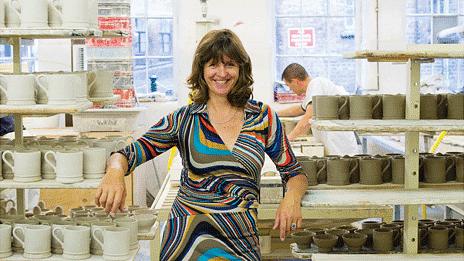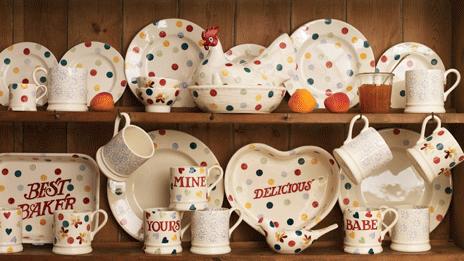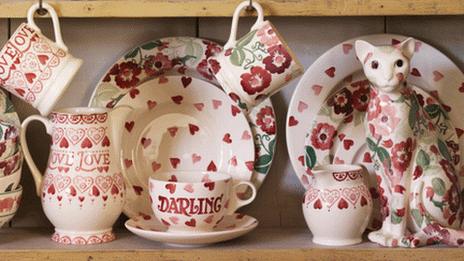Designer Emma Bridgewater's top 10 tips
- Published

British designer Emma Bridgewater started her own pottery company in Stoke-on-Trent in 1985, when she couldn't find a suitable gift for her mother.
Today the company, which she runs with her husband Matthew Rice, employs more than 200 people, and is perhaps best known for Emma's polka dot and pink heart designs.
Bridgewater, who was appointed CBE this week, shares her top 10 tips for being a successful designer.
1. Get a job
Try and get a job in any capacity in a creative company that interests you. I did that for 18 months and what I learned during that time was kind of everything.
That opportunity to be inside a creative company, see what's happening, feel the excitement of it, straight out of college, that's the best possible thing you can do. And don't hang around.
I personally think you should be paid for it, but it doesn't matter how menial a capacity you are employed. Take any job at any price in order to get into a company that interests you.
2. Have self-belief
I knew I was going to be successful. When I first had the idea, I didn't know anything about the ceramics industry, so I came to Stoke-on-Trent in a haze of utter ignorance, but with conviction. I walked around and I could see very definitely that this great big Victorian factory was going to be making nothing but Emma Bridgewater designs one day.
I do have a feeling that in your work, as with the whole of your life, if you can imagine the solution you want, that's half the job. But without it, you won't probably get anywhere much.

3. Start small, but stay ambitious
I started off with just four shapes. A mug, exactly like the one I am drinking from now, a bowl, a milk jug and a dish. My "polka dot" and "hearts" designs are both really good examples of designs that are almost incidental.
These nice, simple, pleasing shapes were a very good way of making a pattern that wasn't too "patterny". People have got to be feeling committed to the idea of decoration to buy roses and jolly animals and things. With spots you can just kind of sneak by someone, it's a pattern that doesn't daunt.
4. Keep having new ideas
I'm completely dedicated to the traditions of making pottery in this country. So the way we do it dominates what our range of pottery looks like. Inspiration is all around - from books that Matthew and I buy, to antique shops and flea markets, to the sort of hinterland of my upbringing.
When you've got an idea, when you've got the shapes and the colours, there is a very nice thing that happens organically. There's a sort of hum that you build up that makes the genesis of new designs possible. It makes a fertile ground for new designs to pop up in. It's vital to keep having new ideas.

5. Be passionate - you've got to love it!
Don't set out to do something that you are not absolutely passionate about because, to get through the hard work of it, you have got to feel passionate and I think probably for me, a big saviour has been the cause of Stoke.
I think at times, if it had just been about making money, I probably would have seriously doubted my intention to carry on. Whereas the feeling of caring about the industry and the city and the people who work here and their skills, the passion for that has been a great driver. I think to try and sell widgets all your life would probably be terrible, you've got to love it!
6. When the idea comes, go for it
I read English at University and pretty much thought I was going to go into publishing. Maybe as a literary agent, something like that. Then after I graduated, I had a clear idea in my head that I was going to start my own company. It was going to be fun, but it was going to be orderly and it was going to make money.
My cousin and I were making canapes for people's drinks parties. We didn't kill anyone, astonishingly, and I was sleeping on her sofa. It was all very uncertain and then I had a wonderful, wonderful moment in a china shop when I was trying to buy Mum a birthday present.
It struck me absolutely, straight between the eyes, that there was a great big yawning gap where the right pottery for her way of life should be. It's strange, isn't it? But I just knew it was going to work.

7. Choose a good name
It's completely vital to have a good name for your brand. I think it's a very simple and single issue: If the company bears your name, there is a connection. You can embody the brand in a very direct way and I think Cath Kidston shows that in the most extemporary fashion.
8. Work hard but know how to switch off
People get where they get by all sorts of different roads but I don't know many successful people who take lots of holidays. For years and years, Matthew and I and the children only ever took two or three days off at a time. There is no point dressing it up, it is blindingly hard work and if that seems daunting it isn't worth doing.
I find it quite hard to switch off. If I'm on my own, I make a very conscious effort to listen to music or a play or an audio book rather than spend the whole time on the telephone. It's vital to have a nice home to escape to.
9. Be prepared to make sacrifices
I work with my husband. For a lot of people the very idea of it is the third circle of hell, but it's worked for us. There's plenty of scrapping but we tend to have found that very productive. I'm sure our children would say it's been a nightmare!
My family have been a huge influence. You do it for your family and then frankly you feel tremendously guilty that the work you're doing, for their benefit, means that you're never there.
Matthew's parents have been massively involved, they've done a huge amount, more school concerts and school runs than me. There's a sort of inherent uneasy dynamic for most working women, I think, which I don't have a secret answer to. Compromise is all there is... and common sense.

Emma with her husband and four children
10. Don't have regrets
I feel constantly dissatisfied with things I haven't done, rather than pleased with the things that I have. If people ask me whether I regret how hard I've worked its always "yes, no, yes, no, yes, no!" The answer I always end up giving is "no". Like most working women, I think, I probably spend a lot of time on that particular guilt treadmill.
But when you step away from it and think about making jobs in an industry that has taken the most appalling knocks; and think about making lovely things that people really, really enjoy giving to each other - those are important things and I think the children do all inherently understand that and think that it is a good thing, too. But they might give you some quite funny answers first about me not ever knowing what their teachers are called!
- Published16 November 2013
- Published9 November 2013